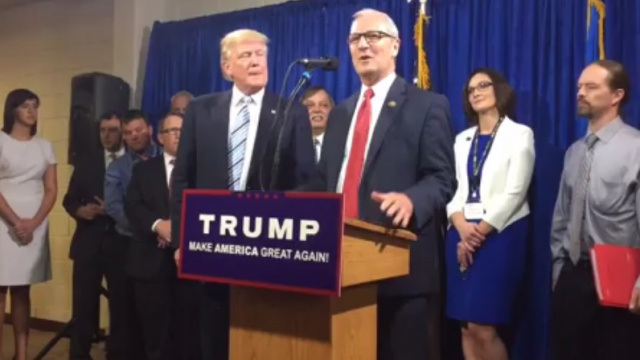Kevin Cramer: Donald Trump Could Bring Workers, Industry Together Under GOP Banner

When asked recently what the GOP would like in five years, Donald Trump predicted, “Five, 10 years from now – different party. You’re going to have a worker’s party.”
Much has been written about growing blue-collar support for Trump’s presidential run and his election prospects. Most political analysts agree that his path to the White House runs through the Rust Belt of Michigan, Ohio, and Pennsylvania – states that can only be delivered to the “America First” candidate with the backing of the working class.
Pundits often overlook what such an unconventional political dynamic could mean for economic policymaking after a Trump victory. Most importantly, a President Trump could follow up his inauguration with an unthinkable coup – one that has eluded the GOP for years – the creation of an alliance between workers and industry in Rust Belt and Energy Patch states.
The implications would be significant. This coalition could help check radical environmentalism and drive regulatory reform across the government by promoting greater transparency, accountability, and scientific integrity. According to a study by the Competitive Enterprise Institute, federal regulations cost our economy an estimated $1.9 trillion in 2015, greater than the economic output of Canada or Mexico. The best available data indicate that regulations from the Environmental Protection Agency alone cost nearly $400 billion annually.
[mks_pullquote align=”right” width=”300″ size=”24″ bg_color=”#ffffff” txt_color=”#000000″]Trade union leaders have long understood the threat posed by the growing influence of radical environmentalism within the Democratic Party.[/mks_pullquote]
Unnecessary and overly burdensome regulation goes unchallenged frequently. Federal agencies can dodge obvious conflicts of interest, withhold from the public key data used to justify rules, and make effective use of an opaque regulatory process that circumvents Congress. This poor governance results in job destruction and snuffs out innovation.
While many blue-collar workers view the GOP as hostile and believe their elected officials routinely prioritize the interests of politically-connected big corporations above their own, they widely trust that Trump would be different. These everyday Americans embrace nationalism and his arguments that unfair trade deals benefit other countries at the expense of U.S. labor. Moreover, they understand that Trump’s “America First” energy message would increase domestic production, creating jobs and expanding U.S. influence overseas.
This confidence in the “America First” narrative could be used to build an effective political campaign in the Rust Belt’s manufacturing and energy producing centers to pressure Democratic members of Congress to end federal policies that destroy jobs.
Trade union leaders have long understood the threat posed by the growing influence of radical environmentalism within the Democratic Party. However, this risk to job preservation – not to mention creation – has become more real during the Obama administration as environmental activists bought greater influence. Democratic economic policies are increasingly shaped by ideologically-driven decarbonization policies as evidenced by former Secretary of State Hillary Clinton’s recent pledge to “put a lot of coal miners and coal companies out of business.” What would have been a taboo position for Democrats in the 1990s is now demanded by environmental constituencies and donors.
Blue-collar opposition to this growing trend played out recently in a scathing letter from Terry O’Sullivan, general president of the Laborers’ International Union of North America, to AFL-CIO president Richard Trumka over the federation’s partnership with billionaire environmentalist Tom Steyer, who helped kill the Keystone XL Pipeline and the thousands of jobs tied to it. Seven trade unions – representing 1.5 million workers – demanded that none of their dues flow to the Steyer-backed super-PAC because of its anti-job agenda.
Blue-collar leaders also recognize that a Hillary Clinton administration would not stop at punishing coal. U.S. manufacturing is next on the climate regulatory hit list with a Clinton EPA widely expected to issue new greenhouse gas rules on major industries, including refining, cement, and steel. If Democrats succeed in retaining the White House, our industrial competitiveness would continue to suffer, putting at risk countless union jobs in trade-exposed sectors.
Secretary Clinton has pledged to impose hefty regulations on hydraulic fracturing, which could destroy the economic and environmental benefits of America’s oil and natural gas boom, including the creation of more than 1 million U.S. manufacturing jobs by 2025. The building trades, particularly in states like Ohio and Pennsylvania, have benefited substantially from the shale revolution as billions of dollars have flowed into manufacturing because of bountiful supplies of cheap natural gas.If Trump wins, he should quickly turn his political victory into an economic triumph for workers by reining in the government, making it harder for bureaucrats to issue job-destroying regulations. Because blue-collar workers trust Trump, he could do what no other Republican has been able to accomplish – lead a partnership of workers and businesses to take back those powers from the executive branch that rightfully belong to the Congress and the states.
One thing is clear, a new unconventional political dynamic is desperately needed to check the federal administrative state and the growth of radical environmentalism in the Democratic Party. And only Trump and his “America First” coalition are positioned to achieve that Herculean task.
This op/ed appeared originally in The Hill




